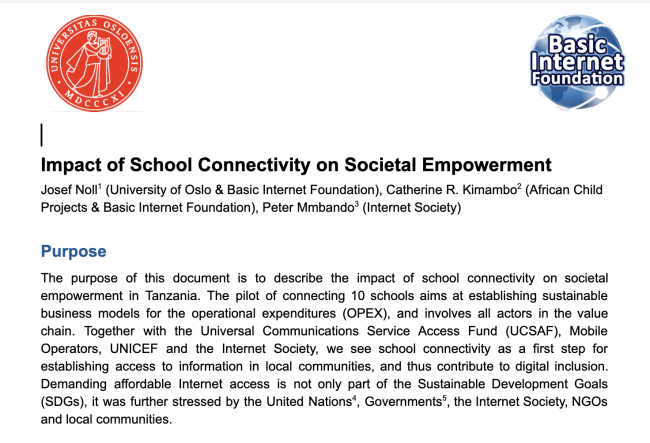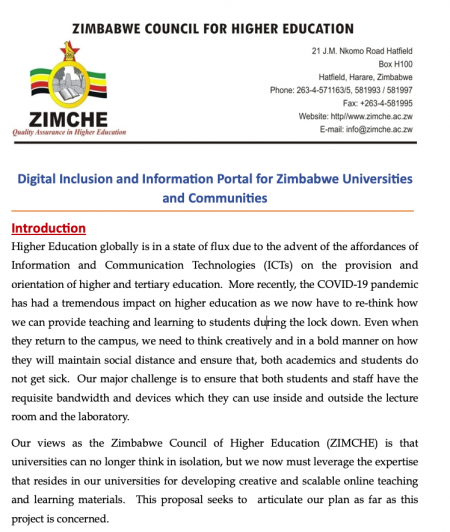BasicInternet:Uni Makerere-BasicInternet 17Jul2020
From its-wiki.no
| Uni Makerere-BasicInternet 17Jul2020 | |||||||
|---|---|---|---|---|---|---|---|
|
BasicInternet:Uni Makerere-BasicInternet 17Jul2020
| Title | BasicInternet:Uni_Makerere-BasicInternet_17Jul2020 |
|---|---|
| Place | Webex |
| Date, Time | 2020/07/17, 1630-1730 |
| Contact Person | Sudhir Dixit |
| Participants | Dorothy Okello, Ronald Lukanga, Edwin Mugume, Sudhir Dixit, Josef Noll |
| related to Project | BasicInternet |
| Keywords |
| this page was created by Special:FormEdit/Meeting, and can be edited by Special:FormEdit/Meeting/BasicInternet:Uni Makerere-BasicInternet 17Jul2020 |
| Category:Meeting |
Conclusions and Follow-up
Next Meeting: 29Jul2020 1630-1730h (Oslo/Brussels time) using http://zoom.basicinternet.no
- Continue the discussion on the ongoing 5G project for rural connectivity, and look for common projects extending on the existing knowledge
- AI: Create a 1-pager on ideas for collaboration, based on (i) the 5G project of University of Makerere and (ii) the free access to the National Knowledge Portal as focus from the Basic Internet Foundation
Topics and background info
Makerere University - 5G connectivity
Makerere has established a 5G project, targeting 5G rural broadband connectivity. The challenges being addressed are
- connectivity from the national backbone to remote villages (typically 40-50 km)
- relevant application areas such as agriculture, eLearning, IoT for industrialisation, Youth, Empowerment, Health & Care
- sustainable business models
Earlier work has used TV white space, which is one of the candidates for reaching out to the villages.
Follow-up discussion expected on relevant technologies, relevant use cases and pan-African collaboration
BasicInternet - from access to empowerment
The Basic Internet Foundation ([BasicInternet.org]) has the vision to improve the life of every human through free access to information on the Internet. The BasicInternet Solution is two-fold; First, we reach out to areas where there is no Internet. Second, we provide Internet Lite, the freemium model for access.
BasicInternet 1.0 - access
The distributed architecture opens for a quick deployment of a cost-effective Internet distribution worldwide, allowing for a reception of a 3G/4G network even in areas with no connectivity. Our examples have proven that we connect even in places without connectivity.
- In Selela, at the border of the Serengeti in Northern Tanzania, we reached the mobile tower being more than 20 km away. Typical 3G coverage is 7-9 km, thus we extended the reach by almost a factor of three.
- In Izazi in the Iringa district, we connected to the mobile network being hidden by the mountain ridge between Izazi and the mobile towers in Migoli. It took us 90 min to establish Internet access in Izazi.
- Together with communities we have activities in 9 countries, out of which 5 countries in Africa - see DigI:Villages
Meetings in Uganda
In Feb2020 we had a visiting trip in Uganda, where we had meetings with UCC, the Internet Society and the Ministry of ICT. In short:
Meeting with the Ministry of ICT on 25Feb2020, including the presentation on National Knowledge Portal for Uganda
- a first information meeting where we presented our vision, demonstrated our solution, and got a feedback on national strategy in Uganda
- we agreed that the Ministry will involve important stakeholders and will follow-up, heading towards a pilot project for school connectivity
Meeting with UCC, Ministry of ICT and Internet Governance Forum on 26Feb2020,
- we got the support from UCC on activities for digital inclusion, focussing on collaboration with the Research and Education Network Uganda (RENU)
- we were advised to talk directly to Telecom operators for getting the sustainable connectivity model out in praxis
- we were advised to also look into other areas where digital empowerment is needed, e.g. the Uganda Strategic Health Plan for primary health services-
Please see further information in the meeting with the Norwegian Embassy in Kampala: DigI:Way-ahead_Embassy_Norway_Uganda
BasicInternet 2.0 - free access to the National Knowledge Portal
Through the Digital Inclusion (DigI) project we have seen a tremendeous knowledge uptake through digital local information spots providing Digital Health, see http://Yeboo.com (community information spot - focus on health)
Thus, BasicInternet 2.0 focusses on the National Knowledge Portal, incorporating all four aspects needed for empowerment in the digital society:
- Access - building Information Spots in villages/communities with free access to information
- Skills - establishing a National Knowledge Portal with information on health, education, agriculture, financial inclusion and more
- Regulations - having free access to the National Knowledge Portal as part of the licence conditions is straightforward
- Inclusion - providing the free access to information is a first step, having tailored information for minorities and people with disabilities is a common demand.
In Zimbabwe, we are working with ZIMCHE on establishing the Educational Knowledge Portal.
Special focus is on sustainability, and a solution that addresses OPEX costs as little as 15-20 USD/month for the connectivity. Please read more in our paper on Impact of school connectivity, the business model for "minimum connectivity"
Common discussion
5G to the villages is a potential option, as device costs will hinder the uptake of 5G distribution in the near future. Now 5G terminals costs about 1000 USD - may be some 500 USD in 1-2 years from now, but still too expensive for most people in rural areas. Thus, an option is to use 5G, dedicated microwave or TV white space to connect the village, and wifi distribution within the village.


